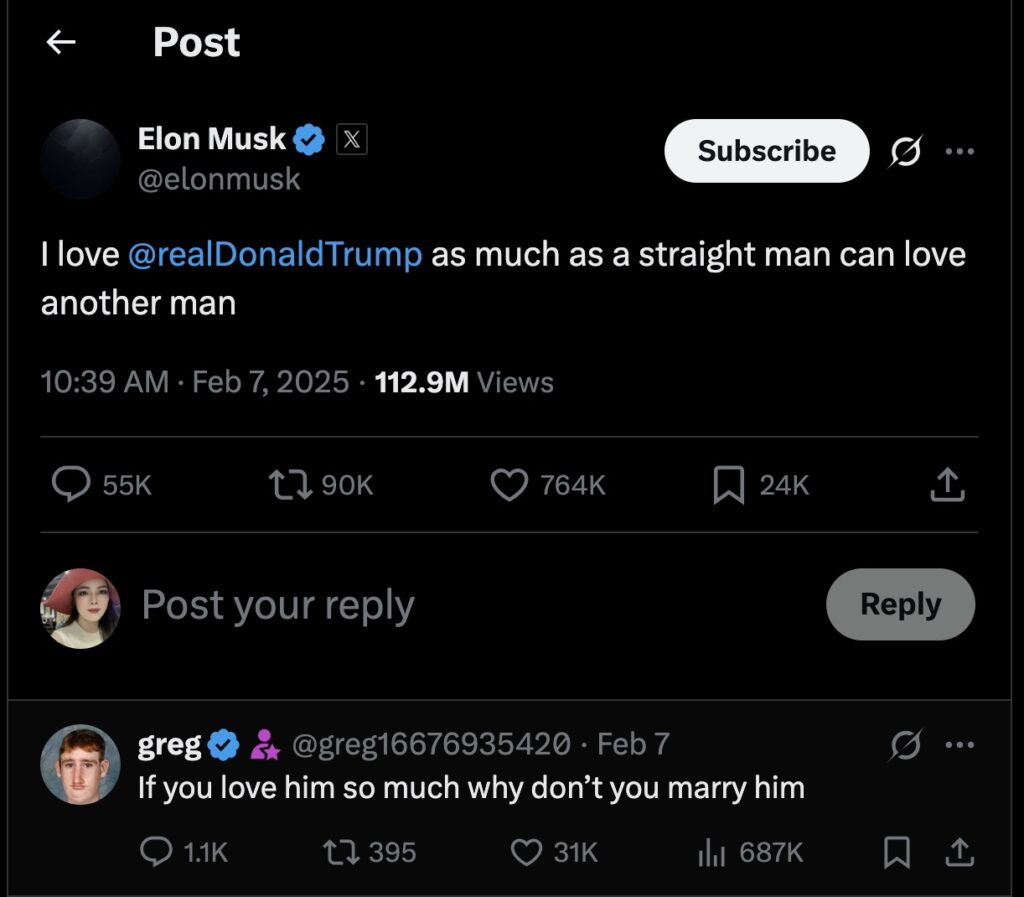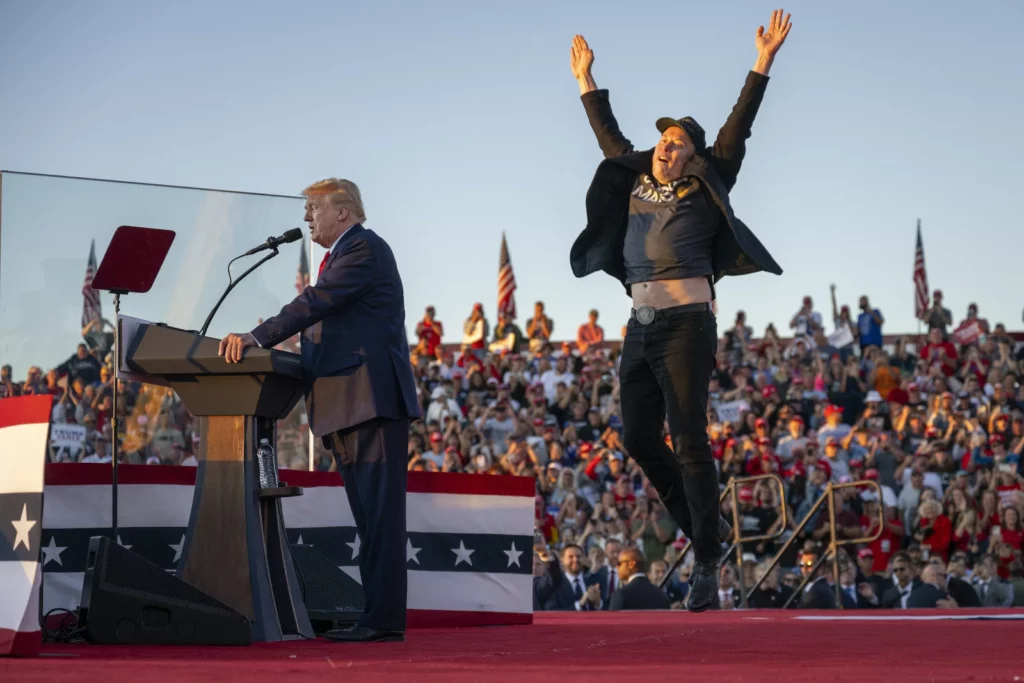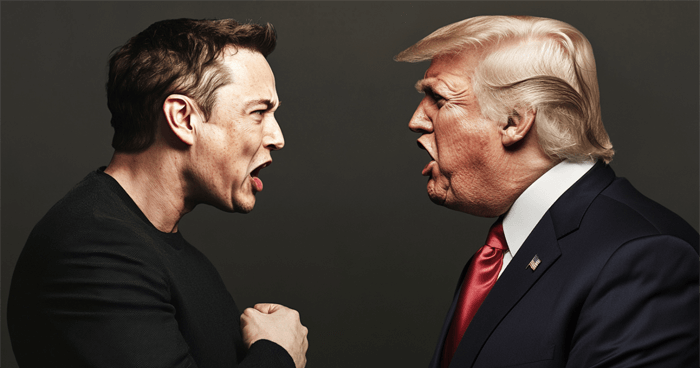By Michelle Tan | BitVision.ai
It’s official. The Trump–Musk alliance has fractured.
But don’t be fooled—this isn’t a story about a lost friendship.
It’s a power struggle between two of America’s most influential forces. And it’s unfolding at the exact moment when the future of technology, economics, and global leadership is on the line.
Elon Backed Trump—Big Time
In 2024, Elon Musk emerged as the most prominent Republican donor, pouring nearly $300 million into support for Trump’s re-election campaign. After years of funding Democrats, this pivot stunned both parties.
He quickly became one of the most visible members of Trump’s inner circle—appearing in the Oval Office, attending Cabinet meetings, and even leading the Department of Government Efficiency.
In February, Musk declared on X:
“I love @realDonaldTrump as much as a straight man can love another man.”

So, what caused the split?
What Caused the Fallout?
It wasn’t about lack of loyalty.
Musk was all in for Trump—especially after the assassination attempt in Butler, Pennsylvania, which marked a turning point. Within minutes, Elon tweeted:
“I fully endorse President Trump and hope for his rapid recovery.”
However, insiders say the problem wasn’t Musk’s support.
It was his rising influence.
Trump’s inner circle began to feel that Musk—through his X platform, AI ventures, and megadonor status—was becoming too powerful—not just a backer but a kingmaker.
That’s when the chill began.
Then came policy cracks: Trump moved to cut EV subsidies under pressure from oil lobbyists and traditional manufacturers. The move directly challenged Tesla’s long-standing advantage. (Read: Is Tesla Still Safe?)
The final spark? Disagreement over the “Big Beautiful Bill.”
Trump praised it as a necessary economic reset.
Musk warned it would balloon the deficit and crush long-term growth.
That was the turning point.
The Real Fight: Influence vs. Control
Trump doesn’t mind support. He minds competition.
Elon Musk isn’t just the wealthiest man on Earth—he’s also becoming America’s most potent, unelected voice.
And in Trump’s world, there’s only room for one king.
Their visions for America diverged sharply.
Trump’s is rooted in nationalism, oil, tariffs, and strong borders.
AI, global markets, electric vehicles, and Mars power Musk’s.
They’re both trying to rebuild America.
But they’re no longer doing it together.
Quick Timeline: Trump x Musk Relationship
- Pre-2024: Musk backed Democrats, including Hillary Clinton in 2016 and Joe Biden in 2020. He was critical of Trump during his first term and resigned from White House councils after Trump exited the Paris Climate Accord.
- 2022: Trump called Musk a “bull**** artist” and claimed he had lied about voting for him. Musk fired back, tweeting:
- “I don’t hate the man, but it’s time for Trump to hang up his hat & sail into the sunset.”
- July 2024: Following the shooting in Butler, PA, Musk endorsed Trump immediately, declaring his full support.
- Late 2024 – 2025: Musk’s influence in the Trump world grows… until it grows too big. The fallout begins.

What It Means for Investors and Builders
This split is more than drama. It will ripple through industries and policy decisions.
- AI Will Face Political Crossfire
- Musk’s expanding AI empire—through xAI and anti-OpenAI rhetoric—is attracting bipartisan scrutiny. Trump’s camp is now signaling support for stricter regulation.
- Tesla Will Be Targeted
- Without federal support and under political pressure, Tesla may lose ground in the U.S. However, globally—and in terms of software, Dojo, and autonomy—it still has a competitive moat. (Read: Is Tesla Still Safe?)
- The New Axis of Influence Is Splitting
- Trump owns the political right. Musk owns the tech narrative. That divide may create fragmented markets, favoring companies that can navigate both power centers.
What Happens Now?
Two paths lie ahead.
- Reconciliation. They patch things up quietly. They align again—for the sake of political momentum and shared enemies.
- Escalation. Musk asserts independence. He may fund alternatives, shape platforms, or influence future candidates beyond Trump’s orbit.
Either way, this split is strategic, not emotional.
It’s about who defines America’s future.
Final Thought: Stay Ahead of the Signal
Trump and Musk are not enemies. They’re competitors for legacy.
And while their fallout may seem personal, it reflects the deep tension between centralized political power and rising tech-driven influence.
If you’re an investor, builder, or policymaker—you’re now navigating two different rulebooks.
Watch where the money flows.
Watch what Musk builds next.
Watch who Trump listens to.
Because tweets or rallies won’t decide the real winner…
